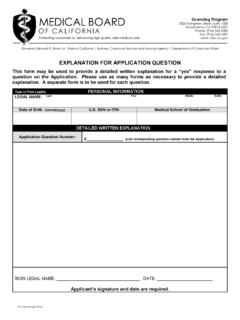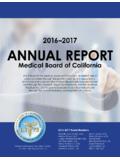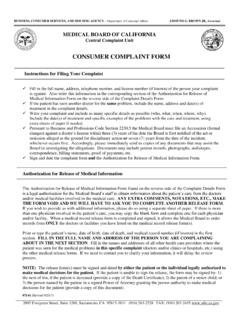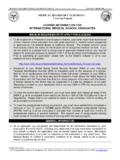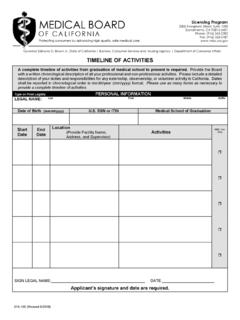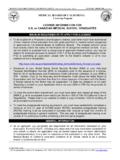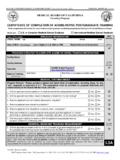Transcription of Guidelines for Recommending Cannabis for Medical Purposes
1 November 2017. Guidelines for the Recommendation of Cannabis for Medical Purposes Medical board OF california . Edmund G. Brown, Jr., Governor Dev GnanaDev, , President, Medical board of california Kimberly Kirchmeyer, Executive Director, Medical board of california Medical board of california 's Guidelines for the Recommendation of Cannabis for Medical Purposes November 2017. PREAMBLE. The Medical board of california ( board ) developed these Guidelines since Cannabis is a permissible treatment modality in california under qualifying circumstances.
2 The board wants to assure physicians who choose to recommend Cannabis for Medical Purposes to their patients, as part of their regular practice of medicine, that they will not be subject to investigation or disciplinary action by the board if they arrive at the decision to make this recommendation in accordance with accepted standards of Medical responsibility. The mere receipt of a complaint that the physician is Recommending Cannabis for Medical Purposes will not generate an investigation absent additional information indicating that the physician is not adhering to accepted Medical standards.
3 These Guidelines are not intended to mandate the standard of care. The board recognizes that deviations from these Guidelines may occur and may be appropriate depending upon the unique needs of individual patients. Medicine is practiced one patient at a time and each patient has individual needs and vulnerabilities. Physicians should document their rationale for each recommendation decision. BACKGROUND. On November 5, 1996, the people of california passed Proposition 215. Through this Initiative Measure, Section was added to the Health and Safety Code, and is also known as the Compassionate Use Act of 1996 (Act).
4 The Purposes of the Act include, in part: "To ensure that seriously ill Californians have the right to obtain and use Cannabis for Medical Purposes where the Medical use is deemed appropriate and has been recommended by a physician who has determined that the person's health would benefit from the use of Cannabis in the treatment of cancer, anorexia, AIDS, chronic pain, spasticity, glaucoma, arthritis, migraine, or any other illness for which Cannabis provides relief; and To ensure that patients and their primary caregivers who obtain and use Cannabis for Medical Purposes upon the recommendation of a physician are not subject to criminal prosecution or sanction.
5 ". Page |1. The Act provides that physicians will not be subject to investigation or disciplinary action by the board if they arrive at the decision to make this recommendation in accordance with accepted standards of Medical responsibility. Although the Act allows the use of Cannabis for Medical Purposes by a patient upon the recommendation of a physician, california physicians should bear in mind that Cannabis is listed in Schedule I of the federal Controlled Substances Act. Based on the increasing number of states permitting the recommendation of Cannabis in patient care, the Department of Justice updated its Cannabis enforcement policy in August 2013 (James M.)
6 Cole, "Guidance Regarding Cannabis Enforcement [Memorandum]," Washington, DC: Department of Justice. (August 19, 2013)). This policy reiterates Cannabis 's classification as an illegal substance under federal law, but advises states and local governments that authorize Cannabis -related conduct to implement strong and effective regulatory and enforcement systems to address any threat state laws could pose to public safety, public health, and other interests. Should these state efforts be insufficient, the federal government may seek to challenge the regulatory structure itself and bring forward individual enforcement actions including criminal prosecutions, focused on those harms.
7 In this context, the United States Department of Justice advised that it likely was not an efficient use of federal resources to focus enforcement efforts on seriously ill individuals, or on their individual caregivers. In doing so, the guidance drew a distinction between the seriously ill and their caregivers, on the one hand, and large-scale, for-profit commercial enterprises, on the other, and advised that the latter continued to be appropriate targets for federal enforcement and prosecution. Guidelines . The board has adopted the following Guidelines for the recommendation of Cannabis for Medical Purposes .
8 Physician-Patient Relationship: The health and well-being of patients depends upon a collaborative effort between the physician and the patient. The relationship between a patient and a physician is complex and based on the mutual understanding of the shared responsibility for the patient's health care. The physician-patient relationship is fundamental to the provision of acceptable Medical care. Therefore, physicians should document that an appropriate physician-patient relationship has been established, prior to providing a recommendation, attestation, or authorization for Cannabis to the patient.
9 Consistent with the prevailing standard of care, physicians should not recommend, attest, or otherwise authorize Cannabis for themselves or family members. Pursuant to Business and Professions (B&P) Code section , a physician shall not recommend Cannabis for Medical Purposes to a patient, unless the physician is the patient's attending physician. Health and Safety (H&S) Code section (a) defines an attending physician as a physician who has taken responsibility for an aspect of the Medical care, treatment, diagnosis, counseling, or referral of a patient.
10 The physician must also have conducted a Medical examination of the patient before recording in the patient's Medical record the physician's assessment of whether the patient has a serious Medical condition and whether the use of Cannabis for Medical Purposes is appropriate. Patient Evaluation: A documented Medical examination and collection of relevant clinical history commensurate with the presentation of the patient must be obtained before a decision is Page |2. made as to whether to recommend Cannabis for a Medical purpose.
